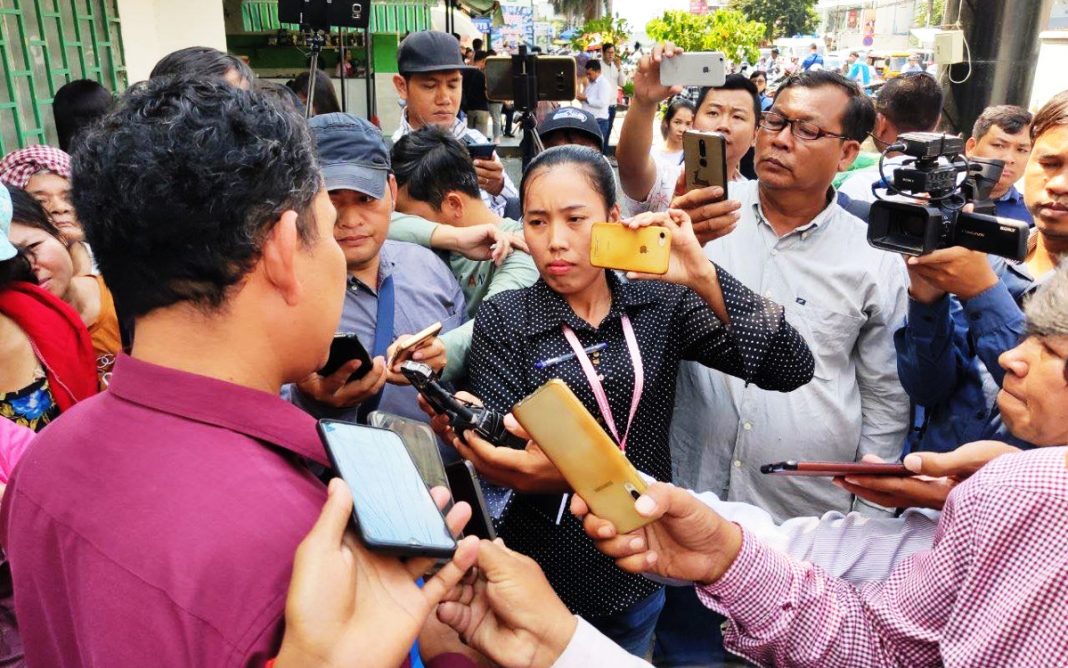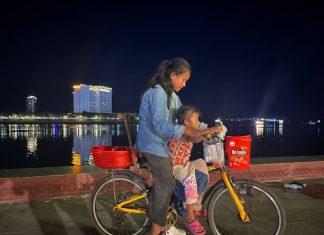Cheng Sokhorng has been discouraged from pursuing her career in journalism, both at home and at work.
“My family always says there are many jobs better than being a journalist, and journalism is not suitable for a woman and not safe,” she says.
She started at The Cambodia Daily in 2009 and also worked at the The Phnom Penh Post as a business reporter. She recently became a freelancer so she can write news more freely, she says.
“I found that the job was not the same as before; I could not bring information properly to the public,” she says. “So I decided to become a freelancer, so I could report more or less independently.”
At work, a male-dominated field routinely behaves insensitively toward the women in it, she says. “You will see more men in your office and outside while reporting, and you will hear teasing or bullying words.”
Both in the newsroom and in the field, female journalists in Cambodia often find that they are alone. Significantly outnumbered by men, they encounter insensitivity and even harassment, they say. The people around them — especially their families, but even colleagues — suggest that the work is not for them, with too many safety and security concerns.
However, some of the women who have stuck with journalism in Cambodia say they take pride in defying the stereotypes.
Khan Leakhena, a reporter at VOD, says she sometimes doesn’t feel like a woman in her work — she chases interviewees among mobs of reporters, and is dressed to run.
But it’s work she loves and believes in. “This job can help people in my country,” she says.
The challenges have been frequent, she says. She has been harassed by locals during field reporting trips to the provinces, and even by other journalists on the job.
“When there is a male-dominant workplace, they always joke around about some topic about girls or something, which makes me feel uncomfortable,” Leakhena says. “Sometimes I might clap back, or I’ll just pretend that I don’t care so it won’t affect our teamwork.”
When she went on a reporting trip to Svay Rieng province in October for a feature on health and education, she faced unwelcome attention after an interview. “A local man kept asking me to drink beer and wanted to hold my hand,” she says.
Afterward, her parents told her to resign because they did not want her to continue traveling and face risks. It took a lot of convincing to gain their support again, she says.
At VOD, Leakhena is one of only two women in a news team of about 15, including all-male editors.
“When there is breaking news, they mostly send male journalists to report the news. They don’t think that sometimes women can do even better,” she says. “Please don’t underestimate women’s abilities.”
Despite the obstacles, however, Leakhena believes that female journalists are invaluable to the industry, and she encourages more women to join the field.
“Please don’t be scared to do what you want,” Leakhena says. “We don’t need anyone to empower us, just empower ourselves and do it.”
“Every time I see that I’m the lone female journalist in a crowd, I feel really proud of myself,”
One of her editors, Sun Sokhen, says VOD makes an effort to hire female journalists, and attributes the lack of women in the newsroom to a lack of interest among women.
“Female applicants are always rare,” he says. “Women themselves think that it is a dangerous kind of work and it is only for men … [and] her family might think it is too dangerous for her.”
He says he would like to have more women in the newsroom, because they would understand women’s issues better and “it is the nature of women to be good at communicating; the way they talk and their strategy to convince people are better than men.”
Sokhen adds that VOD has policies around gender-respecting behavior. Sometimes the male-dominant newsroom goes too far in making insensitive jokes, but “there is nothing serious about it,” he says.
A 2018 report by the Fojo Institute, a Swedish organization that promotes free and independent media, says female journalists in the country face a slew of challenges.
Its survey of 131 Cambodian journalists found a predominance of men in the field, particularly in the provinces and among freelancers; family pressures on women primarily around security fears; and more field opportunities given to men due to the assumption that women are more vulnerable. Two women surveyed said their husbands wanted to divorce them because of the demands of their work.
Sokhorng, the freelancer, says that in the face of obstacles, women journalists have learned to rely on themselves. “Everything depends on us, whether it’s taking care to maintain transparency and security, or even to encourage ourselves.”
Correction (January 24): An earlier version of this article misstated that Khan Leakhena traveled alone to Svay Rieng for a reporting trip in October. She traveled with a camera operator.












